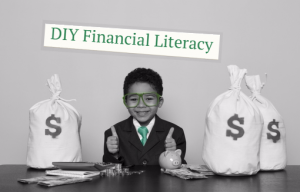Have you ever taken a class that taught personal finance or financial literacy? Since money management is generally not taught in the school system, your answer is probably no. However, it’s an essential element to a well-balanced life, which means it should absolutely be part of any teenager’s education. So, if your school isn’t going to do it for you, you’ve got to do it yourself.
Start your education today and check out these seven financial literacy tips for teenagers.
1. Learn About Budgeting. If your parents use a personal budget, start off by asking them for some advice. If you’re working and bringing in money yourself, try it out at a free website like Mint. Even if you’re not yet responsible for any monthly bills, you can still learn the process and the value of maintaining a budget. Input your numbers and see where you come out. If you find that you’re spending more than you’re earning, try making some changes to your purchasing habits.
2. Save a Portion of Everything. Start by opening a savings account if you don’t already have one – if you’re under 18 you may need your parents to co-sign or open one for you. No matter what kind of money you receive, whether it’s a birthday check from a relative, a cash gift from mom or dad, a paycheck, or even your weekly or monthly allowance, hold onto a portion of it. Even if you only devote 25% of your income to savings, you’re doing yourself some good.
3. Find Better Deals. Whenever you want to buy something, check first to see if there’s a listing on eBay or Amazon at a lower price. For even more opportunities, sign-up for email updates from FatWallet or SlickDeals and get a list of special pricing on various products sent to your inbox each day.
4. Start Building and Improving Your Credit Score. If you have no credit history and can’t get a traditional credit card, sign-up for a secured card, which is backed by your own money. Use it to make small purchases and pay off the balance on time and in full every month.
When you do get a credit card, commit to never carrying a balance on it. Your credit score is golden: It affects things like interest rates for car loans and home mortgages, auto insurance premiums – and some employers even factor it into their hiring process. Start building or improving your score today.
5. Understand Wants and Needs. Right now, your needs are essentially taken care of by your parents – things like food, shelter, and basic monthly services such as gas and electricity. Everything else you have your eye on is a want. This lesson is going to make a lot more sense down the road, but in a nutshell, you should always try to reduce the costs of your needs as much as possible, and eliminate or hold off on as many wants as you can.
6. Forget About Peer Pressure. Ever feel the pinch because your buddy has the latest smartphone and you don’t? Forget about it. If you’re teased or made fun of, ignore it. Peer pressure and spending money have no business together, and if you’re shelling out yours just to appease your acquaintances, you’re not doing yourself any good.
7. Start Earning Cash Now. There are plenty of ways to earn cash as a teenager. You could babysit, cut grass, tutor younger kids, or even run errands for older folks in your neighborhood. Try hosting a garage sale, too, if there are a bunch of old, unneeded things in the house. The sooner you start earning money, the sooner you can get a firmer grasp on managing it.
When I was a teenager, my parents taught me one basic, but profound, lesson about money – either you run your finances or they run you. Instead of falling into the perils of credit card debt or making ill-advised purchases, start learning more about money management and how it works today. Once you’re sufficiently educated, you can reap those benefits for the rest of your life.
Can you think of any financial literacy tips for teenagers?
This guest post was submitted by Joe Wilkinson. Joe writes about financial literacy, money management, and smart spending habits for young people.


